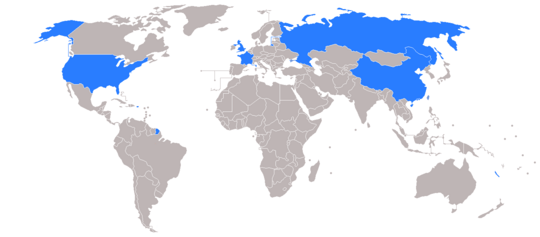Permanent members of the United Nations Security Council facts for kids
The Permanent Members of the United Nations Security Council are five powerful countries. They are also known as the Permanent Five or P5. These countries are China, France, Russia, the United Kingdom, and the United States.
In 1945, the UN Charter gave these five countries a special, permanent seat on the UN Security Council. This means they always have a place at the table. These nations were the main winners of World War II. They also all have nuclear weapons.
One very important power they have is the veto power. This allows any one of them to stop a decision from being made by the Security Council. Even if many other countries agree, one P5 member can say "no" and block it. The Security Council has 15 members in total. The other 10 members are elected for a short time by the UN General Assembly.
Contents
The Permanent Five Countries
Here are the five permanent members of the UN Security Council:
| Country | What they are called now | Their main leaders | Their representative at the UN |
|---|---|---|---|
| General Secretary and President: Xi Jinping Premier: Li Keqiang |
Zhang Jun | ||
| President: Emmanuel Macron Prime Minister: Élisabeth Borne |
Nicolas de Rivière | ||
| President: Vladimir Putin Chairman of the Government: Mikhail Mishustin |
Vasily Nebenzya | ||
| Monarch: Elizabeth II Prime Minister: Boris Johnson |
Barbara Woodward | ||
| President: Joe Biden | Linda Thomas-Greenfield |
A Look at History
When the UN was created in 1945, the five permanent members were the French Republic, the Republic of China, the Soviet Union, the United Kingdom, and the United States.
There have been two important changes to these seats:
- China's seat: The original seat was held by the Republic of China (ROC). But after a civil war, the Communist Party of China took control of mainland China. They formed the People's Republic of China (PRC). In 1971, the UN decided that the PRC was the true representative of China. So, the PRC took the Security Council seat. The ROC, which moved to the island of Taiwan, was no longer part of the UN.
- Russia's seat: The Soviet Union was one of the original five members. When the Soviet Union broke apart in 1991, Russia was seen as its legal successor. This meant Russia took over the Soviet Union's permanent seat on the Security Council.
France also changed its government several times. But its international status stayed the same. So, France kept its permanent seat.
These five countries were the winners of World War II. They have kept the strongest military forces in the world ever since. They spend a lot of money on their defense. They are also the only countries officially recognized as having nuclear weapons under a special treaty.
What is Veto Power?
The "veto power" is a special right that only the five permanent members have. It lets them stop any important decision (called a "substantive" resolution) from being passed by the Security Council. This is true even if many other countries support the decision.
However, the veto power does not apply to votes about how the Council works (called "procedural" votes). If a permanent member chooses not to vote (abstains) or is absent, it does not stop a decision from being adopted. The veto only happens if a permanent member votes "no."
Thinking About More Members
Many countries have suggested adding new permanent members to the Security Council. The countries most often mentioned are Brazil, Germany, India, and Japan. These four countries are known as the G4 nations. They support each other's goal of becoming permanent members.
However, some other countries are against this idea. They form a group called "Uniting for Consensus." This group includes countries like Italy and Spain (who oppose Germany), Mexico and Argentina (who oppose Brazil), Pakistan (who opposes India), and South Korea (who opposes Japan). Instead of new permanent members, this group suggests having semi-permanent seats or more temporary seats.
Many of the G4 nations are often elected to temporary seats on the Security Council. Japan has been elected 11 times, Brazil 10 times, and Germany 3 times. India has been elected 8 times.
Current Leaders of the Permanent Members
Here are the current leaders of the permanent members of the UN Security Council as of 2022:
-
 Xi Jinping
Xi Jinping
Paramount Leader of the
People's Republic of China
since 15 November 2012 -
 Emmanuel Macron
Emmanuel Macron
President of the
French Republic
since 14 May 2017 -
 Vladimir Putin
Vladimir Putin
President of the
Russian Federation
since 7 May 2012 -
 Joe Biden
Joe Biden
President of the
United States of America
since 20 January 2021
Images for kids
-
Leaders of the five permanent member states at a summit in 2000. From left: Chinese leader Jiang Zemin, U.S. President Bill Clinton, UK Prime Minister Tony Blair, Russian President Vladimir Putin, and French President Jacques Chirac.
See also
 In Spanish: Miembros permanentes del Consejo de Seguridad de las Naciones Unidas para niños
In Spanish: Miembros permanentes del Consejo de Seguridad de las Naciones Unidas para niños
 | William Lucy |
 | Charles Hayes |
 | Cleveland Robinson |









